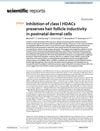
Search
for
Sort by
Research
930-960 / 1000+ results

research A Splice Variant in KRT71 Is Associated with Curly Coat Phenotype of Selkirk Rex Cats
A gene variant in KRT71 causes the curly fur in Selkirk Rex cats.

research Keratin 71 Mutations: From Water Dogs to Woolly Hair
A mutation in the KRT71 gene causes a hair disorder by disrupting hair follicle structure and texture.

research A Review of the Etiologies, Clinical Characteristics, and Treatment of Canities
Gray hair is caused by reduced melanin production or transfer issues, linked to aging and possibly health conditions, with treatments focusing on color camouflage.

research Hair Graying Regulators Beyond Hair Follicle
Hair graying is influenced by factors like nerves, fat cells, and immune cells, not just hair follicles.

research A Clinical and Biological Guide for Understanding Chemotherapy-Induced Alopecia and Its Prevention
Scalp cooling can help prevent chemotherapy-induced hair loss with a 50-90% success rate and is safe for patients.

research Stem Cells and Alopecia: A Review of Pathogenesis
Damaged hair follicle stem cells can cause permanent hair loss, but understanding their role could lead to new treatments.

research A Bald Statement: Current Approaches to Manipulate Miniaturization Focus Only on Promoting Hair Growth
The conclusion is that future hair loss treatments should target the root causes of hair thinning, not just promote hair growth.

research Differentiation of Human Dermal Mesenchymal Stem Cells into Cardiomyocytes by Treatment with 5-Azacytidine: Concept for Regenerative Therapy in Myocardial Infarction
Skin stem cells were turned into heart cells using a chemical, suggesting a new way to treat heart attacks.

research CD99 Is Strongly Expressed in Basal Cells of the Normal Adult Epidermis and Some Subpopulations of Appendages: Comparison with Developing Fetal Skin
CD99 is highly present in certain skin cells and could help treat skin conditions.

research Chemotherapy-Induced Alopecia
Chemotherapy often causes hair loss, which usually grows back within 3 to 6 months, but there's no effective treatment to prevent it.

research MiR-23b and MiR-133 Cotarget TGFβ2/NOTCH1 in Dermal Fibroblasts and Affect Hair Follicle Development in Sheep
Two microRNAs affect hair follicle development in sheep by targeting specific genes.

research A Preview of Selected Articles
New treatments for hair loss, fertility, and wound healing are being explored.

research Vitamin D and Human Health: Lessons from Vitamin D Receptor Null Mice
Mice without the vitamin D receptor have bone issues and other health problems, suggesting vitamin D is important for preventing various diseases in humans.

research Skin Wound Healing in Humans and Mice: Challenges in Translational Research
The document concludes that mouse models are helpful but have limitations for skin wound healing research, and suggests using larger animals and genetically modified mice for better human application.

research Cartilage to Bone Transformation During Fracture Healing Is Coordinated by the Invading Vasculature and Induction of the Core Pluripotency Genes
Blood vessels and specific genes help turn cartilage into bone when bones heal.

research Evaluation of Non-Activated and Activated PRP in Hair Loss Treatment: Role of Growth Factor and Cytokine Concentrations Obtained by Different Collection Systems
PRP treatment improves hair growth, and the device used can affect results, with some being more effective.

research Epidermal Stem Cells Manipulated by pDNA-VEGF165/CYD-PEI Nanoparticles Loaded Gelatin/β-TCP Matrix as a Therapeutic Agent and Gene Delivery Vehicle for Wound Healing
The gelatin/β-TCP scaffold with nanoparticles improves wound healing and skin regeneration.

research Lymphoid Enhancer-Binding Factor-1 Interacts with the DNA-Binding Domain of the Vitamin D Receptor
LEF1 interacts with Vitamin D Receptor, affecting hair follicle regeneration and this could be linked to hair loss conditions.

research Improved Cutaneous Wound Healing After Intraperitoneal Injection of Alpha-Melanocyte-Stimulating Hormone
Injecting alpha-melanocyte-stimulating hormone in mice improved skin healing and reduced scarring.

research Characterization and Quantification of Wound-Induced Hair Follicle Neogenesis Using In Vivo Confocal Scanning Laser Microscopy
In vivo confocal scanning laser microscopy is an effective, non-invasive way to study and measure new hair growth after skin injury in mice.

research A Guide to Studying Human Dermal Adipocytes In Situ
The guide explains how to study human skin fat cells and their tissue, aiming to improve research and medical treatments.

research Comparative Biology of Tissue Repair, Regeneration, and Aging
The symposium concluded that understanding how different species repair tissue and how this changes with age can help advance regenerative medicine.

research CircRNA-0100 Positively Regulates the Differentiation of Cashmere Goat SHF-SCs into Hair Follicle Lineage via Sequestering miR-153-3p to Heighten the KLF5 Expression
A circular RNA helps cashmere goat hair cells become hair follicles by blocking a molecule to boost a gene important for hair growth.

research Hair Growth Promoting Effect of Dermal Papilla-Like Tissues from Canine Adipose-Derived Mesenchymal Stem Cells Through Vascular Endothelial Growth Factor
Lab-made tissues from dog fat stem cells can help grow hair by releasing a growth factor.

research Baldness May Be Caused by the Weight of the Scalp: Gravity as a Proposed Mechanism for Hair Loss
Baldness might be caused by scalp weight pressing on hair follicles.

research Inhibition of Class I HDACs Preserves Hair Follicle Inductivity in Postnatal Dermal Cells
Inhibiting class I HDACs helps maintain hair growth ability in skin cells.

research Skin Biology
Current therapies cannot fully regenerate adult skin without scars; more research is needed for scar-free healing.

research Rac-Dependent Signaling from Keratinocytes Promotes Differentiation of Intradermal White Adipocytes
Signals from skin cells controlled by Rac proteins help turn certain precursor cells into white fat cells.

research Research Progress in Composition, Classification and Influencing Factors of Hair
Lipids are important for healthy hair, but their exact role is not fully understood and needs more research.